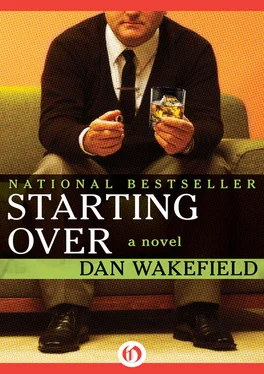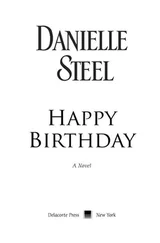Those were the pleasant kinds of thoughts that came to him while looking out the front window, but when he had to turn back into the apartment itself he felt less assured and confident of things. Not that there was anything wrong with the apartment; it was the sort of place that prompted everyone to say, “You could really do a lot with it.” The problem was, Potter did not know how. What furniture he and Jessica had accumulated during their marriage he had left for her own use. He hated the painful process of “dividing up,” and anyway he didn’t want to bring the furniture of his old life into his new one. He only brought books and records. Marva Bertelsen had been kind enough to take him to Jordan Marsh to pick out a rug for the living room, and help him get the necessary linen and towelling. She also showed him a second-hand furniture store in Cambridge where he bought a couch for the living room, a mattress and springs for the bedroom, and a beat-up desk and chair. He picked up a couple of canvas sling chairs for the living room, and improvised a coffee table by setting a varnished door on some cement blocks. He had meant to use the blocks for putting a bookcase together, but he thought the coffee table more important, so that left the bookcase still to be done, and in the meantime he kept the books in the old liquor boxes he had packed them in, and shoved them against the wall in the living room where the actual bookcase would be when he got around to setting it up. The walls were white and nude, except for a travel poster of Rio de Janeiro that Potter hung with thumbtacks.
Supplying the kitchen turned out to be the hardest part of all. It was hardest because when Potter went to buy the minimal stuff he needed, it reminded him of all the times before he was married when he had moved from one place to another, finding it easier to leave junk behind and pick up a new set of pots and pans and dimestore dishes and silverware to start with again. He bought four of everything, anticipating a girl for himself and a nice other couple they would entertain with quiet gourmet dinners at home. Selecting the cheapest stuff he could, he rushed through the ordeal as quickly as possible, throwing in dishtowels and potholders and paring knives at random, performing the task with a feeling very much like swimming underwater. When he finished, he took his rattling packages and ducked into the nearest bar for a double Scotch on the rocks.
Once he recovered from the essential furnishing, Potter bought a marked-down portable stereo, a model that probably was mostly sold to Puerto Ricans new to the mainland. He was being frugal. He even figured he could do without a television.
In a few weeks, he changed his mind about that.
Potter had stayed on at Olney and Sheperdson through most of the summer, working hard, padding his expense account more than usual, and saving as much as he could for the coming time of his new, more stringent circumstances. He moved into his place in Cambridge in early September, in time for the hot gold burst of Indian summer that fired the whole city with a heightened glow. Scores of schools and colleges and universities began preparation for a new semester, and the atmosphere was charged with a pleasant sense of anticipation.
Except for quiet dinners at the Bertelsens’, Potter didn’t do much in the way of social life, nor did he desire to yet. It was an intermediate time for him, a pause between his old life and new one about to begin. There were times like that when he found it was best to hold back, to wait, to be alone as much as you could stand it, to try not to press things. Potter had a roommate in college who referred to such times as periods in which he “devoted himself to science”—read a great deal, tried to get some exercise, refrained from alcoholic or sexual or emotional binges, in general rallied his forces, got into shape for the good times to come.
You had to believe, of course, that the good times indeed were coming, and that wasn’t always easy. Sometimes Potter was stricken with doubts and regrets, wondering if what he was doing made sense. Sometimes the thought of Jessica opened in his mind like a sudden wound, and he would wonder where she was, what she was doing—who she was doing it with. The line of the old song, slightly revised, would ring through his head in a cruel taunt: “I wonder who’s fucking her now?” He heard she was back in New York, and was thankful he wasn’t there himself where he might run into her, walking hand in hand with some new lover, looking cool and glamorous.
He walked a lot. Every morning he walked the eight blocks into Harvard Square, where he bought the Boston Globe and The New York Times and went to breakfast at a cafeteria on Brattle Street where you could sit and pore over the papers, refill your coffee, and not be rushed into eating up and moving on. After breakfast he walked down to the Charles and strolled along the banks. Occasionally he found a game of touch football he could get into. That was one of the best things. The running and jumping and throwing and blocking that brought sweat to the body also washed the mind clean. He would walk home pleasantly aching and exhausted, take long showers, get into his bathrobe, and settle down to read. He hadn’t read so much in years—not only books for his courses, but novels in paperback whose titles he had bandied about at cocktail parties with the bluff assurance he got from culling descriptions in reviews. Around midnight he would flick on the tube and burrow into bed for the talk shows and late movies that, with enough Scotch, usually got him to sleep.
He thought of it not as a bad time, but a “thin” one. He had found that time itself changes in different periods of one’s life—sometimes it seems fat with events and decisions, victories and defeats, each moment full—and in other periods time seems thin, one-dimensional, the hours long and slender, stretched like a wire. It was that kind of time now and he accepted it, moved with it. Patiently. Restrained. Carefully hopeful.
The week before the fall semester began at Gilpen Junior College, Potter was invited to a cocktail party at the home of Dean Hardy. The Dean lived in Cambridge in an old but socially suitable two-story frame house convenient to the shrines of Harvard, whose mere physical presence gave him comfort, and, as he admitted with what seemed to Potter a lascivious smile, “stimulation.”
The Dean had rented a Harvard student, handsomely blond and red-jacketed, to serve as bartender, and also had on hand a glum professor of history from Harvard, who sighed and jingled the change in his right-hand pocket a lot, and whose conversation mainly consisted of gruff-sounding grunts. Potter wondered if he, too, had been rented for the occasion.
The Dean’s wife, Lucy, was a birdlike woman with tightly curled hair and a manner of fluttering sincerity that led her to grasp the hand of each guest in both of hers with a tight little squeeze of welcome. She was everywhere at once, moving at what seemed to be the speed of people in silent movies.
Dean Hardy made a special point of introducing Potter to Professor Don R. Sample, who was Chairman of the Communications Department. Sample had earned his Ph.D. at the University of Illinois College of Communications, and had taught journalism all his life. He had written his thesis on automotive trade publications, and was regarded as one of the leading authorities in that field, having served as special consultant for what he referred to as “the Honda people,” in the area of publications.
“I understand that you—uh—have had a good deal of experience on the practical—umm—side,” Sample said.
“I was in public relations,” Potter answered.
Sample, an extremely tall, gaunt fellow, leaned slightly downward to address Potter, rocking slightly as he spoke. “The Dean,” he said, “values the practical side very highly.”
Читать дальше












